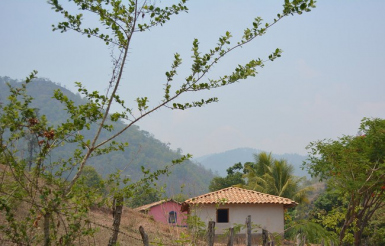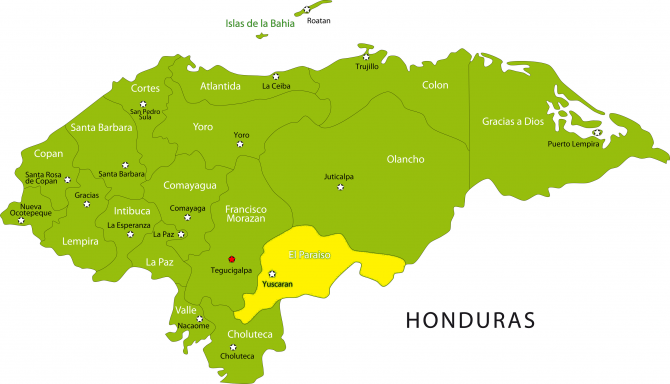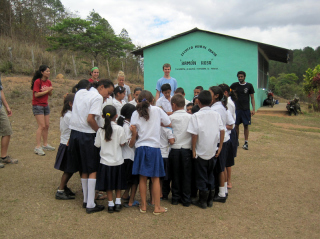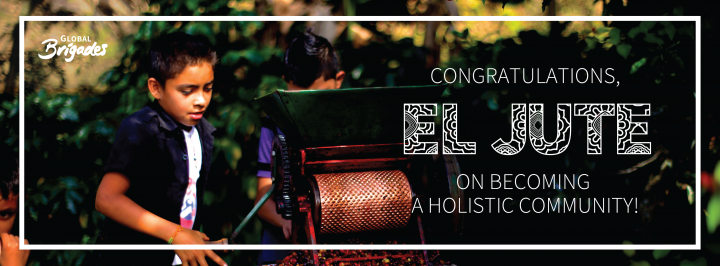El Jute, Honduras
![]()
![]()
![]()
![]()
![]()
![]()
![]() Click on Programs to learn more about their work in this community
Click on Programs to learn more about their work in this community
General Information

| Population* | 380 |
| Number of homes | 70 |
| Avg # of people per home | 5.5 |
| Primary Occupations | Agriculture - coffee, beans and corn |
| Water System | Yes |
| Community Bank | Yes |
| % of Homes with Latrines | 100% |
| Electricity | Yes - solar power |
| Corresponding Health Center | CESAMO Teupasenti ~ 2 hours walking |
| Common Illnesses | Gastritis, Respiratory Infections |
| School Access & Distance | Kinder-6th grade, 5-15 minutes walking distance. Closest highschool ~ 2 hours walking |
| Municipality | Teupasenti |
| Department | El Paraiso |
| GPS |
N 14° 12.650’ W 086° 46.286’ |
| Distance from compounds | 1 hour and 45 minutes |
* Population does not reflect how many patients will be seen on medical
brigades as many people from surrounding communities come seeking
Medical Brigades medical attention.
Top Needs Expressed
El Jute and Global Brigades are proud to say that through holistic programming, the top health and economic needs of the community have been covered. El Jute also has proven strong leadership and capitalized funds in their community bank in order to address any needs that arise in the future.

El Jute is a community located near the municipality of Teupasenti, high in the mountains. It is close to several other communities that Global Brigades works in, such as El Canton and Santa Rosa. There are many other smaller communities in the area that come to medical brigades that happen in El Jute.
El Jute’s educational system includes Kinder and Primary schools (through 6th grade). There are approximately 45 students at the school. It is approximated that about 90% of the community knows how to read and write.
The closest high school is in Teupasenti, the local municipality. It takes about 2 hours to walk there, and 1 hour via bicycle. Not many students in El Jute have the means or opportunity to go to school past 6th grade.
El Jute has a water system that was first constructed in 1992 by the government-supported project ALA 8620. Three communities are dependent on the project, but there was not enough pressure to bring water to all homes in the community. Global Brigades helped re-vamp the water project, in El Cantón, one of the nearbyecommunities that was sharing the previous water system. Water Brigaders from four different universities worked in El Cantón between March 2011 and February 2012. During that time, those volunteers worked with community members to install a control valve at the dam and build a wall to divert stream water away from it, repair and paint at 11,000 gallon chlorination tank, construct a new distribution chamber to divide the water between the three communities, dig approximately 14,238 meters of trench, install 14,238 meters of PVC piping and 654 meters of iron piping, and connect 87 houses, 2 schools, and 3 churches to the water system. During the El Cantón project, improvements were also made to the portions of the water system that serve these two neighboring communities. Water brigades worked with all three communities to install 1.5 kilometers of new, larger diameter piping in the conduction line, and install cleaning, air and control valves in the pipeline. In addition a pressure break tank and aerial stream crossing in the pipeline were repaired and a new distribution chamber was constructed to properly distribute an appropriate amount of water to each of the three communities.
El Jute does not have a rural health center in the community. The nearest health center is in Teupasenti, about a 2-hour walking distance, and is staffed by full-time physicians and nurses including Lic. Doris Lainz. There are 3 health volunteers in the community that work in conjunction with health center initiatives. Dental care is not available in community, though it is available in Teupasenti.
Prior to Global Brigades' arrival, community members in El Jute suffered from a lack of proper water, hygiene
and sanitation infrastructure, healthcare, and education. Between February and June of 2013, over 500 volunteers and staff members worked with community members to identify community leaders and train them to form the Basic Sanitation Committee, build 58 eco-stoves, 59 latrines, 59 showers, 56 water storage units, and 130 cement floors, and conduct educational workshops emphasizing the importance of sanitation and hygiene in the local primary school.
The average family income per month is estimated to be 1750 Lempiras, which is approximately L350 (US $18.53) per person1. The majority of homes are made of adobe. The main form of employment is in agriculture on owned land and the main products that are cultivated in the community are corn and beans.
El Jute now has a community bank with Global Brigades with 18 members, over 180 savings accounts, and approximately 30 outstanding loans. With this bank, community members are able to have access to low interest loans. The bank has also encouraged the start of a new microenterprise: a tilapia farm. Check back soon to hear how it goes!
El Jute is one of several communities in the large Teupasenti region where Global Brigades has a large presence and a strong working relationship with the local mayor.
El Jute does not receive medical brigades from any organization other than Global Brigades. In 2004, PRODERCO worked on a cement floor project as well as watershed protection project, and helped to train the community bank.

Source of information: Key informant interview, Centro de Salud statistics
Date of interview: 18 May 2010
1According to Red Solidaria and World Food Programme in Honduras, the average family is approximated at 5 people per household, the poverty line is L930 (US$49.23) per person per month, and the extreme poverty line is L617 (US$32.66) per person per month.
